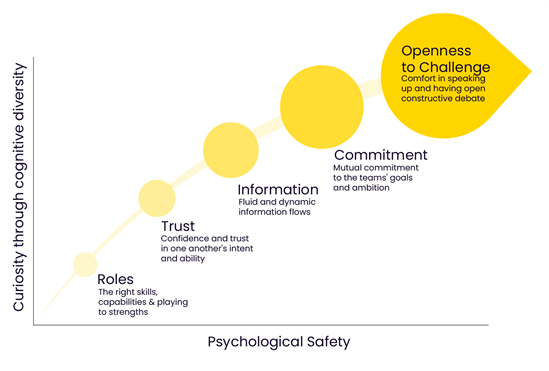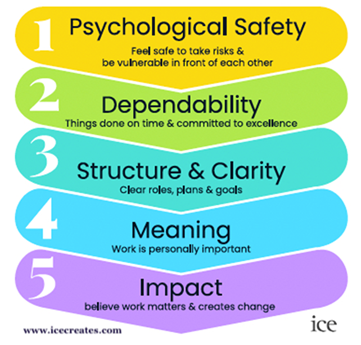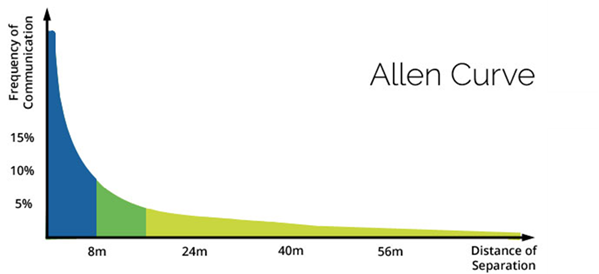Bruce Tuckman’s traditional model of how teams progress suggests four stages – Forming, Storming, Norming, and Performing. It’s an easy-to-follow model, yet in today’s hybrid work the lack of face-to-face connection opportunities, both in time and regularity, means that this model has some flaws. People are dispersed, virtual, temporary, and potentially remote.
So how do you know if things are going well?

As Jeff Pfeffer says, unless you are a sole contributor, your success depends on other people. Put it another way, most of us are part of a team.
An essential element in the success of any group of people, “a team”, is problem-solving, and by extension the ability to deliver on goals and objectives. Problem-solving requires people to have an environment with a way of work that supports ideation, risk-taking and a high quality of interaction. Put another way, creative, innovative effort is created by collaborative teams of people who can cover diverse terrain, bring different skills to bear and work effectively together.
Through ICE’s research and experience, we have found that “performing” teams are essential to being able to create a needed new future for our Public Sector, especially the NHS, achieving some of the cost reductions while holding on to excellence. Amy Edmondson often jokes about this – she studied teams and bumped into strategies, and we often work from a strategic design and continually bump into teams as a central part of delivering strategy.
The result of all this learning is a simple, but rich diagnostic that can quickly pinpoint where your team's energy can be enhanced. It measures four core characteristics that determine whether a team is likely to produce results – or just frustration. The construct of the performing team has 5 stages of development and clearly aligns to Amy Edmundson and Google’s Project Aristotle work.

5 Domains of High Performance
1. Roles
Obvious maybe, but if you don’t have the right people in the right roles, your team will struggle. Why does this happen so often? Basically, from a failure to structure the team in the first place. We recruit and support many NHS organisations to recruit right up to board level in three places, the way a person thinks (psychometric), how they feel (emotional intelligence), and where they like to work in the delivery process (behaviour preference).
We need to think about what a team must accomplish, the types of problems they will need to solve, the hurdles they will need to overcome, the new approaches they will need to imagine, and the objectives they will need to achieve. Yet we too often assemble teams based on who is available. Or let people volunteer. We let friend groups decide to do projects together. We stick people on teams when we don’t know what else to do with them. What often happens is that we create teams with critical skill, behavioural, or capability gaps. At the core, we know the journey of problem-solving needs diverse roles from innovators, refiners, galvanisers, optimisers, connectors, evaluators, and completers. It is key and important that you have the range or things will slow down or worse collapse.
2. Trust
A big myth of teamwork is that you must like one another to trust one another. I work with people who I may not be socially happy hanging out with, but whose work and capabilities and their purpose (their intent) I trust immensely. Trust is born of repeated, predictable interaction, closely linked with confidence. If you do what you say you will, and behave in a consistent way, that fosters and builds trust. If you are erratic, unpredictable and unreliable, trust is not built and can erode immensely. It is also critical to trust that your words and actions line up, authenticity counts in the quality of relationship and trust – people are very good at sniffing out hypocrisy and selfish behaviours. It is always a balance of self and others.
3. Information flow
As teams work more virtually, and teams have 3,4,5 or more channels for communication, one very robust research conclusion is that you must be much more deliberate about structuring the flows of information than if everyone is physically together, you just don’t get those corridor or kitchen connections. One of the most famous studies was done by MIT’s Thomas Allen, in which he found that if people were physically located more than 60 feet apart, they may as well have been on the other side of the country. His findings were summarized in the very famous “Allen Curve.”

As we continue to build ways to work post covid we are consistently becoming more hybrid/virtual and need to pay much more attention to the structuring and sharing of information.
4. Commitment
All the other factors aside, a huge issue with teams has to do with members’ commitment to the layers of contribution, the furthest away often being the organisation they are part of and closer being the team’s success and closest being personal success.
Great team players hold the order of mission, team, individual in balance, difficult team members often place to much empathise on individual or team commitment and lose sight of the mission of the organisation. It is so important to have clarity of what the organisation is trying to achieve in a way that is relatable to the team and each person. People aren’t necessarily bad people if they aren’t committed, and that’s important to remember.
They may be lost and not able to buy into the tasks or projects in front of them. They may have other priorities. It may not be in their own best interest to see this team succeed. Whatever the issues with commitment, the sooner you can recognise it and bring them to the surface and address them, the better.
5. Openness to Challenge
Underpinned by a high level of psychological safety, first identified by Amy Edmondson and subsequently developed on by many practical world-leading OD thinkers and doers, refers to the ability of team members to bring up information without fear of being punished or ridiculed.
Openness to challenge grows out of the four previous team development steps. Performing teams continually share information about mistakes, about an opinion that differs from the norm or a point of view, they are comfortable with challenging the status quo, they hold respect and are curious, they also bring challenges about loss of focus, innovators often struggle here and need detail orientated or refiners to notice and help them. Teamwork.
Openness isn’t always consistent with what powerful people want to hear, especially as performing teams work with hierarchy of accountability and not hierarchy of power or seniority.
The big issue is that if you don’t have openness to challenge underpinned by high psychological safety and cognitive diversity in your team, incredibly valuable information may never make it into your conversation. Amy’s research has found that a lack of such safety can literally cost lives and create havoc in complex health systems our work echoes this.
Diagnosis
With this short explanation behind us, I’m delighted to share that at ICE, we’ve created a free version of the survey we use to do the team assessment. You can access it by sending an email to Jonny.read@icecreates.com. This version of the culture map lets you assess how a team that you’re a part of is working and where their energy is being used.
The full set of powerful tools is available from the ICE person-centred insight suite of assessment instruments. Our tools add perspective layers to better understand your organisation. Across individuals, teams, and your organisation as a whole.
With this data, we identify the most troubling issues and recommend interventions to resolve them. We’ve seen teams completely transform how they operate after taking the survey and debriefing it – not bad for the effort of answering just 3 short questions online! Try it out for yourself, and if it’s something you would like to use for your team, we can administer the survey and provide a debrief. Contact Jonny.read@icecreates.com to set that up.
This article is distributed as part of our monthly Organisational Development Newsletter. Sign up here to join the growing community of leaders and change makers.
If you would like to know more, we can share our resources with you. Please contact ideas@icecreates.com.